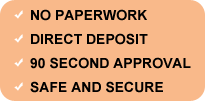Easy Ways to Improve Your Budget
A survey conducted in 2011 by the Financial Literacy Group found that only about 40% of adult Americans have a budget and keep track of the most common monthly expenditures such as housing, food, and transportation. Try to imagine walking a long tight rope without a safety net. That's the way the other 60% stumble through their financial lives... never knowing where their money is actually going every month until it runs out a few days (or weeks) before the next paycheck. This scenario generally creates a lot of stress and the very-real threat of a financial meltdown.
The importance of having a realistic budget cannot be overemphasized. A workable budget allows you to monitor your expenses and maintain a close watch on your spending. But, let's face it, in this tough economy it can be truly challenging finding ways to save.
The following suggestions can help improve your budget so that it works even better for you.
Smart Tips to Make a Better Budget
Your budget isn't written in stone. It's important to remember that a budget is fluid - meaning that it can change and be improved upon at any given time. As old debt is paid off, more money will become available to go towards savings or other outstanding debt. The same holds true if you receive a pay increase or bonus. An increase in income isn't a green light to increase your spending.
Here are some smart ways to improve your budget:
-
Set your priorities. The average budget usually revolves around three main costs: housing, transportation, and food. "The Big 3" probably take up between half and two-thirds of your total take-home pay. Once you have determined what you spend on these items (plus any other debts you owe), then you can formulate how much is left to put towards savings, entertainment, and household expenses.
-
Be kind to yourself. When you go over your budget, be sure to set aside some money for leisure activities, such as going to the movies, an occasional dinner out, or hobbies. If your budget is one of total deprivation, you probably won't stick to it for very long or else will come up short every month because you overspend.
-
Track your spending habits. One of the many positive aspects of a good budget is that it allows you to see where you made sound financial decisions and where you made some not-so-sound ones. Recognizing your (financial) weaknesses can be very enlightening and is crucial if you ever want to improve your money management skills.
-
Keep a spending diary. This is usually a real eye-opener for most people. For one month, literally write down everything you spend. You can also keep every receipt and then total them up at the end of the four weeks. The goal of this financial exercise is to discover what you actually spend versus what you think you spend. Lunches out, taxi rides, daily visits to the coffee house- they all add up. By seeing your spending in black and white, it should be easier to determine where you can make cuts.
-
Don't make it harder than it is. If you've never successfully lived on a budget, it may take some time and frequent adjustments. Try to stay away from situations which you know may be difficult (for example, impulse purchases). Don't go to the mall if the temptation is just too great. Refrain from online shopping. Know what emotional triggers may cause you to overspend. With time and determination, you can learn to control your money and not let it control you.
-
Share your financial goals with friends and family. When you first start budgeting and tracking your spending, you may find that unnecessary shopping trips or frequent nights out with friends are some of your budget-busters. If you have a spouse or partner, both of you should be in agreement on how to handle the family finances. To successfully live on a budget, the whole family should be included in the decision-making process (even children depending on their ages). If you're single, let your friends know your financial plans, within reason, so that they can appreciate when you say "no thanks" to a shopping spree or after-work happy hour. There are many fun, social things to do which don't involve enormous amounts of cash- dinner parties at home (everyone brings a dish), movie night (rent a DVD), free concerts or art festivals. Be creative and enjoy the savings!
Contrary to what many people may think, a budget doesn't have to be terribly restrictive. In fact, often times the opposite is true. Taking control of your finances can be very empowering especially if you have been living paycheck to paycheck and struggling to make ends meet each month. A realistic budget allows you to see where your hard-earned money is going and make smart choices on how you want to achieve your financial goals.
Keep in mind that circumstances change and that includes financial matters. Adapt your budget to keep on track. If you're constantly overspending in one area, find ways to make cuts elsewhere. Pare down and learn to live with less. Don't try to keep up with everyone else- it's a never-ending road that leads nowhere. The financial security that comes with controlling your spending is well worth the time and effort it takes to live on a budget!


